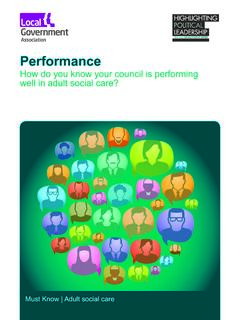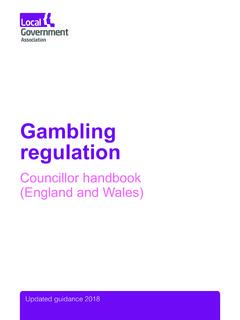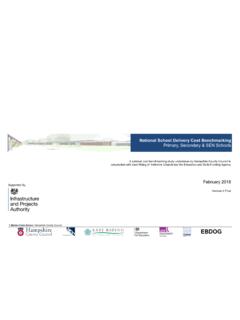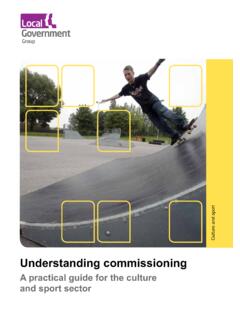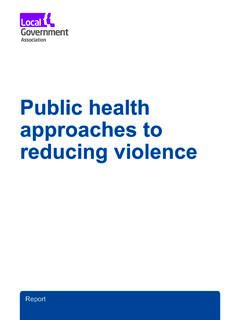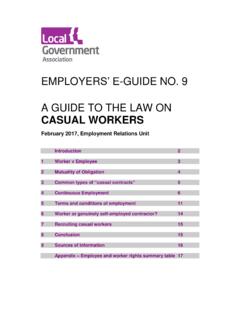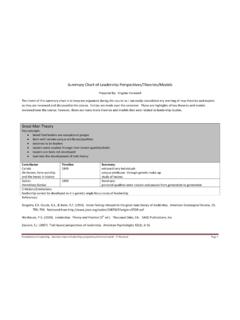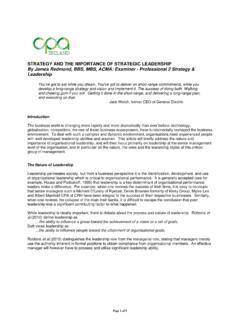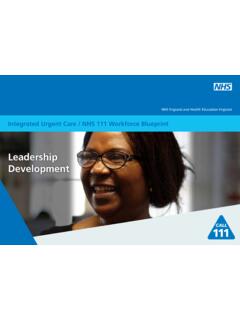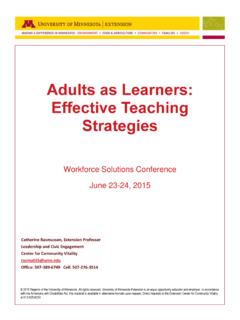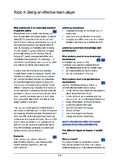Transcription of Safeguarding adults - Local Government Association
1 1 Use of resourcesMust Know | Adult social careSafeguarding adultsHow do you know your council is being effective in keeping people safe?3 Safeguarding adultsKey messages Ensure that you understand your statutory and community leadership responsibility for adult Take a leadership role in ensuring that all the bodies responsible for adult Safeguarding work effectively with each other. Ensure that you, your fellow councillors and all council staff who come into contact, understand Local arrangements for raising issues of concern about neglect and abuse; and that there are clear pathways of reporting and responding to harm. Take a leadership role in supporting and developing a culture that enables Safeguarding support to be delivered within the six key statutory Safeguarding adults principles and the wellbeing principle. Seek assurance that this is the case.
2 Seek assurance that people who need Safeguarding services are fully involved in, and in control of, Safeguarding arrangements and processes at both practice and strategic level. Raise awareness of Safeguarding issues with members of the public in your area. Develop a good relationship with the chairs of the Safeguarding adults and children and health and Ensure that learning and development is made available to both staff and councillors on Safeguarding policies, procedures and practice, including ongoing opportunities for reflective practice. Ensure that Safeguarding arrangements are in place for young people transitioning from children s to adult s services. Ensure that there are specific arrangements in place to act in the best interests of people who lack capacity under the Mental Capacity Act Chapter 14, Care & Support Statutory Guidance, DH, 2018 Statutory Guidance, para 8 What you need to knowAdult Safeguarding is everyone s responsibility.
3 Safeguarding means protecting people s right to live in safety, free from abuse and neglect. It applies to adults with care and support needs who may not be able to protect themselves. Action to safeguard adults should include: promoting well-being and preventing abuse and neglect from happening in the first place ensuring the safety and wellbeing of anyone who has been subject to abuse or neglect involving all those who can offer support and impact on reducing risks taking action against those responsible for abuse or neglect taking place learning lessons and making changes that could prevent similar abuse or neglect happening to other leadership of Safeguarding is not a substitute for action by care providers, commissioners, regulators and/or the Local leadershipIn your role as having responsibility for the political leadership , accountability and direction of the council s services for adults , a portfolio holder has a role in ensuring that the various departments within a council work together to.
4 Promote wellbeing prevent social exclusion protect vulnerable adults from abuse both through responses to situations involving abuse/neglect and through broader measures aimed at Safeguarding adultsCouncillors will need to know what questions to ask to hold to account those responsible for adult Safeguarding , and to ensure that everyone is following agreed multi-agency procedures, and that appropriate links are made between agencies so that people at risk and needing help are not partnershipsPortfolio holders and other councillors can help build the system leadership to ensure that every Local partner is clear what their responsibilities are and is able to communicate what the Local Safeguarding system is to Local leaders can play a key role in reinforcing the need for collective responsibility for Safeguarding . Local partners work alongside the responsibility of providers and the Care Quality Commission for the quality of provision.
5 The Care Act sets out Local responsibilities and roles for protecting adults receiving care and support from abuse or neglect for the first time in primary legislation. It states that the council is the organisation with overall responsibility for Safeguarding locally. Each area will be expected to ensure that their Safeguarding adults board (SAB) has a core membership of the council, the NHS and the police. Safeguarding is now seen as a crucial aspect of Local partnership work, linking to many Local agendas including, care quality, mental capacity, community safety and cohesion, scams, domestic abuse, violence against women and girls, sexual exploitation, homelessness and rough sleeping, modern slavery and support for carers. Each Local area will need effective leadership to develop its own means of addressing the activities and services that they feel interface with Safeguarding adults Collections via NHS Digital: and Making Safeguarding Personal Outcome Framework Statutory Guidance, Reference Care Act (2014) Section 42 (1) and (2) and Care & Support Statutory Guidance, 2018, (paras )SABs should be monitoring the impact and effectiveness of Safeguarding in their Local areas.
6 The SAB will be required to publish a Local Safeguarding plan and annual reports on progress against that plan, to ensure that member agencies activities are effectively coordinated. Councillors can review and scrutinise the annual reports of the SAB to see what improvements and progress have been made. There are statutory performance reports which provide a further means of understanding the impact of Safeguarding activity in a Local Safeguarding adults reviews (SARs) carried out locally will indicate areas of learning and Local priorities for improvement in services and interagency working. Reviews must be carried out by a SAB where, an adult in its area dies as a result of abuse or neglect, whether known or suspected, and there is concern that partner agencies could have worked more effectively to protect the adult. 4 Councils must make decisions on a case by case basis as to which issues should be considered under their statutory Section 42 duty to make Safeguarding Other issues might more appropriately be dealt with through other routes including complaints, employment law, contract monitoring and compliance, regulation and quality improvement processes.
7 All of these routes, used effectively, will safeguard Making Safeguarding Personal Councillors can encourage Local partners and SABs to develop an understanding of the difference that Safeguarding support makes for people. There are also crucial roles for councillors in examining how Safeguarding is experienced by Local people, how people 5 Safeguarding adultswere consulted and involved in developing policies and monitoring services, and how they were involved in their own Safeguarding plans and can also have a key role in ensuring that conversations take place with people who may be at risk of abuse or neglect. They can seek assurance that there is a focus on the outcomes people want to achieve, rather than the process. Involvement of the people concerned in adult Safeguarding is enshrined in Safeguarding policy and statutory guidance Making Safeguarding Personal (MSP) is set out alongside the six key statutory principles, as a core These also should underpin work locally:Activity since the implementation of the Care Act has focused on supporting SABs and partner organisations in actively leading a culture policy and practice change to MSP.
8 Further information can be found in the useful resources section below. Essential steps are reflected below, with the core principles driving all of these: 6 Statutory Guidance, paras and Statutory Guidance, para , this will mean leading a shift to ensuring partners work together to prevent harm and promote dignity, empowerment and choice. People should be asked what outcomes they want from Safeguarding and whether those outcomes are being achieved: It is vital that all organisations recognise that adult Safeguarding arrangements are there to protect individuals. We all have different preferences, histories, circumstances and life- styles , so it is unhelpful to prescribe a process that must be followed whenever a concern is raised. 7 Safeguarding , personalisation and riskThe MSP approach involves asking people s views on whether risk has reduced without compromising the other things that are important to them.
9 Personalisation and Safeguarding can be made to work hand in hand. There needs to be a proportionate approach to risk, rather than a process which is detached from the individual concerned. A focus on gaining a shared commitment and approach to partnership working with risk, and supporting its implementation in front line practice is also key. adults without mental capacity have legal safeguards under the Mental Capacity Act (MCA) 2005 and must have the representation of an advocate or representative to act in their best interests. The MCA guidance and principles should be at the heart of good Safeguarding adults principlesinfluence/support leadership and cultureengage with people and enable early intervention/preventionpromote staff development and supportwork effectively with partners across organisations6 Safeguarding adultsQuestions to considerProviding Local leadership Is Local people s welfare being secured by good commissioning, contracts management and, for some, by care management or other forms of review?
10 Are staff supported to share information so they can spot potentially serious issues and be to respond to it proactively? What are you and your council and health and wellbeing board doing to publicise issues of Safeguarding in your community and to ensure that there is widespread knowledge of how to recognise and report abuse? Does your contract specification for Local Healthwatch explicitly include a remit on Safeguarding issues? Do you specify appropriate training on Safeguarding and how to report concerns for Healthwatch representatives? What can you do to support such training? Are you and your authority ensuring that people understand and use the Mental Capacity, Mental Health and Human Rights Acts and their functions to safeguard people s rights? How do you know that the MCA is implemented robustly in your area and in accordance with statutory principles?
